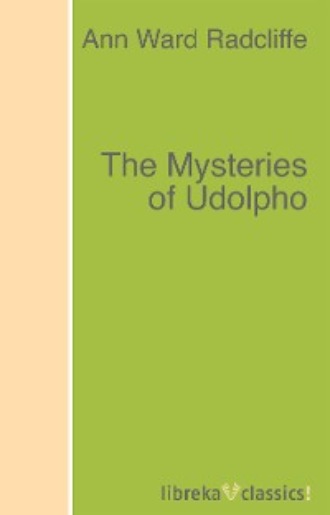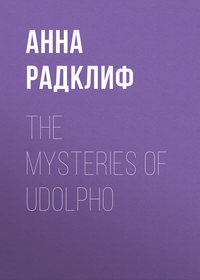
Полная версия
The Mysteries of Udolpho
'Your sorrow is useless. Do not receive this as merely a commonplace remark, but let reason THEREFORE restrain sorrow. I would not annihilate your feelings, my child, I would only teach you to command them; for whatever may be the evils resulting from a too susceptible heart, nothing can be hoped from an insensible one; that, on the other hand, is all vice—vice, of which the deformity is not softened, or the effect consoled for, by any semblance or possibility of good. You know my sufferings, and are, therefore, convinced that mine are not the light words which, on these occasions, are so often repeated to destroy even the sources of honest emotion, or which merely display the selfish ostentation of a false philosophy. I will shew my Emily, that I can practise what I advise. I have said thus much, because I cannot bear to see you wasting in useless sorrow, for want of that resistance which is due from mind; and I have not said it till now, because there is a period when all reasoning must yield to nature; that is past: and another, when excessive indulgence, having sunk into habit, weighs down the elasticity of the spirits so as to render conquest nearly impossible; this is to come. You, my Emily, will shew that you are willing to avoid it.'
Emily smiled through her tears upon her father: 'Dear sir,' said she, and her voice trembled; she would have added, 'I will shew myself worthy of being your daughter;' but a mingled emotion of gratitude, affection, and grief overcame her. St. Aubert suffered her to weep without interruption, and then began to talk on common topics.
The first person who came to condole with St. Aubert was a M. Barreaux, an austere and seemingly unfeeling man. A taste for botany had introduced them to each other, for they had frequently met in their wanderings among the mountains. M. Barreaux had retired from the world, and almost from society, to live in a pleasant chateau, on the skirts of the woods, near La Vallee. He also had been disappointed in his opinion of mankind; but he did not, like St. Aubert, pity and mourn for them; he felt more indignation at their vices, than compassion for their weaknesses.
St. Aubert was somewhat surprised to see him; for, though he had often pressed him to come to the chateau, he had never till now accepted the invitation; and now he came without ceremony or reserve, entering the parlour as an old friend. The claims of misfortune appeared to have softened down all the ruggedness and prejudices of his heart. St. Aubert unhappy, seemed to be the sole idea that occupied his mind. It was in manners, more than in words, that he appeared to sympathize with his friends: he spoke little on the subject of their grief; but the minute attention he gave them, and the modulated voice, and softened look that accompanied it, came from his heart, and spoke to theirs.
At this melancholy period St. Aubert was likewise visited by Madame Cheron, his only surviving sister, who had been some years a widow, and now resided on her own estate near Tholouse. The intercourse between them had not been very frequent. In her condolements, words were not wanting; she understood not the magic of the look that speaks at once to the soul, or the voice that sinks like balm to the heart: but she assured St. Aubert that she sincerely sympathized with him, praised the virtues of his late wife, and then offered what she considered to be consolation. Emily wept unceasingly while she spoke; St. Aubert was tranquil, listened to what she said in silence, and then turned the discourse upon another subject.
At parting she pressed him and her niece to make her an early visit. 'Change of place will amuse you,' said she, 'and it is wrong to give way to grief.' St. Aubert acknowledged the truth of these words of course; but, at the same time, felt more reluctant than ever to quit the spot which his past happiness had consecrated. The presence of his wife had sanctified every surrounding scene, and, each day, as it gradually softened the acuteness of his suffering, assisted the tender enchantment that bound him to home.
But there were calls which must be complied with, and of this kind was the visit he paid to his brother-in-law M. Quesnel. An affair of an interesting nature made it necessary that he should delay this visit no longer, and, wishing to rouse Emily from her dejection, he took her with him to Epourville.
As the carriage entered upon the forest that adjoined his paternal domain, his eyes once more caught, between the chesnut avenue, the turreted corners of the chateau. He sighed to think of what had passed since he was last there, and that it was now the property of a man who neither revered nor valued it. At length he entered the avenue, whose lofty trees had so often delighted him when a boy, and whose melancholy shade was now so congenial with the tone of his spirits. Every feature of the edifice, distinguished by an air of heavy grandeur, appeared successively between the branches of the trees—the broad turret, the arched gate-way that led into the courts, the drawbridge, and the dry fosse which surrounded the whole.
The sound of carriage wheels brought a troop of servants to the great gate, where St. Aubert alighted, and from which he led Emily into the gothic hall, now no longer hung with the arms and ancient banners of the family. These were displaced, and the oak wainscotting, and beams that crossed the roof, were painted white. The large table, too, that used to stretch along the upper end of the hall, where the master of the mansion loved to display his hospitality, and whence the peal of laughter, and the song of conviviality, had so often resounded, was now removed; even the benches that had surrounded the hall were no longer there. The heavy walls were hung with frivolous ornaments, and every thing that appeared denoted the false taste and corrupted sentiments of the present owner.
St. Aubert followed a gay Parisian servant to a parlour, where sat Mons. and Madame Quesnel, who received him with a stately politeness, and, after a few formal words of condolement, seemed to have forgotten that they ever had a sister.
Emily felt tears swell into her eyes, and then resentment checked them. St. Aubert, calm and deliberate, preserved his dignity without assuming importance, and Quesnel was depressed by his presence without exactly knowing wherefore.
After some general conversation, St. Aubert requested to speak with him alone; and Emily, being left with Madame Quesnel, soon learned that a large party was invited to dine at the chateau, and was compelled to hear that nothing which was past and irremediable ought to prevent the festivity of the present hour.
St. Aubert, when he was told that company were expected, felt a mixed emotion of disgust and indignation against the insensibility of Quesnel, which prompted him to return home immediately. But he was informed, that Madame Cheron had been asked to meet him; and, when he looked at Emily, and considered that a time might come when the enmity of her uncle would be prejudicial to her, he determined not to incur it himself, by conduct which would be resented as indecorous, by the very persons who now showed so little sense of decorum.
Among the visitors assembled at dinner were two Italian gentlemen, of whom one was named Montoni, a distant relation of Madame Quesnel, a man about forty, of an uncommonly handsome person, with features manly and expressive, but whose countenance exhibited, upon the whole, more of the haughtiness of command, and the quickness of discernment, than of any other character.
Signor Cavigni, his friend, appeared to be about thirty—inferior in dignity, but equal to him in penetration of countenance, and superior in insinuation of manner.
Emily was shocked by the salutation with which Madame Cheron met her father—'Dear brother,' said she, 'I am concerned to see you look so very ill; do, pray, have advice!' St. Aubert answered, with a melancholy smile, that he felt himself much as usual; but Emily's fears made her now fancy that her father looked worse than he really did.
Emily would have been amused by the new characters she saw, and the varied conversation that passed during dinner, which was served in a style of splendour she had seldom seen before, had her spirits been less oppressed. Of the guests, Signor Montoni was lately come from Italy, and he spoke of the commotions which at that period agitated the country; talked of party differences with warmth, and then lamented the probable consequences of the tumults. His friend spoke with equal ardour, of the politics of his country; praised the government and prosperity of Venice, and boasted of its decided superiority over all the other Italian states. He then turned to the ladies, and talked with the same eloquence, of Parisian fashions, the French opera, and French manners; and on the latter subject he did not fail to mingle what is so particularly agreeable to French taste. The flattery was not detected by those to whom it was addressed, though its effect, in producing submissive attention, did not escape his observation. When he could disengage himself from the assiduities of the other ladies, he sometimes addressed Emily: but she knew nothing of Parisian fashions, or Parisian operas; and her modesty, simplicity, and correct manners formed a decided contrast to those of her female companions.
After dinner, St. Aubert stole from the room to view once more the old chesnut which Quesnel talked of cutting down. As he stood under its shade, and looked up among its branches, still luxuriant, and saw here and there the blue sky trembling between them; the pursuits and events of his early days crowded fast to his mind, with the figures and characters of friends—long since gone from the earth; and he now felt himself to be almost an insulated being, with nobody but his Emily for his heart to turn to.
He stood lost amid the scenes of years which fancy called up, till the succession closed with the picture of his dying wife, and he started away, to forget it, if possible, at the social board.
St. Aubert ordered his carriage at an early hour, and Emily observed, that he was more than usually silent and dejected on the way home; but she considered this to be the effect of his visit to a place which spoke so eloquently of former times, nor suspected that he had a cause of grief which he concealed from her.
On entering the chateau she felt more depressed than ever, for she more than ever missed the presence of that dear parent, who, whenever she had been from home, used to welcome her return with smiles and fondness; now, all was silent and forsaken.
But what reason and effort may fail to do, time effects. Week after week passed away, and each, as it passed, stole something from the harshness of her affliction, till it was mellowed to that tenderness which the feeling heart cherishes as sacred. St. Aubert, on the contrary, visibly declined in health; though Emily, who had been so constantly with him, was almost the last person who observed it. His constitution had never recovered from the late attack of the fever, and the succeeding shock it received from Madame St. Aubert's death had produced its present infirmity. His physician now ordered him to travel; for it was perceptible that sorrow had seized upon his nerves, weakened as they had been by the preceding illness; and variety of scene, it was probable, would, by amusing his mind, restore them to their proper tone.
For some days Emily was occupied in preparations to attend him; and he, by endeavours to diminish his expences at home during the journey—a purpose which determined him at length to dismiss his domestics. Emily seldom opposed her father's wishes by questions or remonstrances, or she would now have asked why he did not take a servant, and have represented that his infirm health made one almost necessary. But when, on the eve of their departure, she found that he had dismissed Jacques, Francis, and Mary, and detained only Theresa the old housekeeper, she was extremely surprised, and ventured to ask his reason for having done so. 'To save expences, my dear,' he replied—'we are going on an expensive excursion.'
The physician had prescribed the air of Languedoc and Provence; and St. Aubert determined, therefore, to travel leisurely along the shores of the Mediterranean, towards Provence.
They retired early to their chamber on the night before their departure; but Emily had a few books and other things to collect, and the clock had struck twelve before she had finished, or had remembered that some of her drawing instruments, which she meant to take with her, were in the parlour below. As she went to fetch these, she passed her father's room, and, perceiving the door half open, concluded that he was in his study—for, since the death of Madame St. Aubert, it had been frequently his custom to rise from his restless bed, and go thither to compose his mind. When she was below stairs she looked into this room, but without finding him; and as she returned to her chamber, she tapped at his door, and receiving no answer, stepped softly in, to be certain whether he was there.
The room was dark, but a light glimmered through some panes of glass that were placed in the upper part of a closet-door. Emily believed her father to be in the closet, and, surprised that he was up at so late an hour, apprehended he was unwell, and was going to enquire; but, considering that her sudden appearance at this hour might alarm him, she removed her light to the stair-case, and then stepped softly to the closet. On looking through the panes of glass, she saw him seated at a small table, with papers before him, some of which he was reading with deep attention and interest, during which he often wept and sobbed aloud. Emily, who had come to the door to learn whether her father was ill, was now detained there by a mixture of curiosity and tenderness. She could not witness his sorrow, without being anxious to know the subject of; and she therefore continued to observe him in silence, concluding that those papers were letters of her late mother. Presently he knelt down, and with a look so solemn as she had seldom seen him assume, and which was mingled with a certain wild expression, that partook more of horror than of any other character, he prayed silently for a considerable time.
When he rose, a ghastly paleness was on his countenance. Emily was hastily retiring; but she saw him turn again to the papers, and she stopped. He took from among them a small case, and from thence a miniature picture. The rays of light fell strongly upon it, and she perceived it to be that of a lady, but not of her mother.
St. Aubert gazed earnestly and tenderly upon his portrait, put it to his lips, and then to his heart, and sighed with a convulsive force. Emily could scarcely believe what she saw to be real. She never knew till now that he had a picture of any other lady than her mother, much less that he had one which he evidently valued so highly; but having looked repeatedly, to be certain that it was not the resemblance of Madame St. Aubert, she became entirely convinced that it was designed for that of some other person.
At length St. Aubert returned the picture to its case; and Emily, recollecting that she was intruding upon his private sorrows, softly withdrew from the chamber.
CHAPTER III
St. Aubert, instead of taking the more direct road, that ran along the feet of the Pyrenees to Languedoc, chose one that, winding over the heights, afforded more extensive views and greater variety of romantic scenery. He turned a little out of his way to take leave of M. Barreaux, whom he found botanizing in the wood near his chateau, and who, when he was told the purpose of St. Aubert's visit, expressed a degree of concern, such as his friend had thought it was scarcely possible for him to feel on any similar occasion. They parted with mutual regret.
'If any thing could have tempted me from my retirement,' said M. Barreaux, 'it would have been the pleasure of accompanying you on this little tour. I do not often offer compliments; you may, therefore, believe me, when I say, that I shall look for your return with impatience.'
The travellers proceeded on their journey. As they ascended the heights, St. Aubert often looked back upon the chateau, in the plain below; tender images crowded to his mind; his melancholy imagination suggested that he should return no more; and though he checked this wandering thought, still he continued to look, till the haziness of distance blended his home with the general landscape, and St. Aubert seemed to
He and Emily continued sunk in musing silence for some leagues, from which melancholy reverie Emily first awoke, and her young fancy, struck with the grandeur of the objects around, gradually yielded to delightful impressions. The road now descended into glens, confined by stupendous walls of rock, grey and barren, except where shrubs fringed their summits, or patches of meagre vegetation tinted their recesses, in which the wild goat was frequently browsing. And now, the way led to the lofty cliffs, from whence the landscape was seen extending in all its magnificence.
Emily could not restrain her transport as she looked over the pine forests of the mountains upon the vast plains, that, enriched with woods, towns, blushing vines, and plantations of almonds, palms, and olives, stretched along, till their various colours melted in distance into one harmonious hue, that seemed to unite earth with heaven. Through the whole of this glorious scene the majestic Garonne wandered; descending from its source among the Pyrenees, and winding its blue waves towards the Bay of Biscay.
The ruggedness of the unfrequented road often obliged the wanderers to alight from their little carriage, but they thought themselves amply repaid for this inconvenience by the grandeur of the scenes; and, while the muleteer led his animals slowly over the broken ground, the travellers had leisure to linger amid these solitudes, and to indulge the sublime reflections, which soften, while they elevate, the heart, and fill it with the certainty of a present God! Still the enjoyment of St. Aubert was touched with that pensive melancholy, which gives to every object a mellower tint, and breathes a sacred charm over all around.
They had provided against part of the evil to be encountered from a want of convenient inns, by carrying a stock of provisions in the carriage, so that they might take refreshment on any pleasant spot, in the open air, and pass the nights wherever they should happen to meet with a comfortable cottage. For the mind, also, they had provided, by a work on botany, written by M. Barreaux, and by several of the Latin and Italian poets; while Emily's pencil enabled her to preserve some of those combinations of forms, which charmed her at every step.
The loneliness of the road, where, only now and then, a peasant was seen driving his mule, or some mountaineer-children at play among the rocks, heightened the effect of the scenery. St. Aubert was so much struck with it, that he determined, if he could hear of a road, to penetrate further among the mountains, and, bending his way rather more to the south, to emerge into Rousillon, and coast the Mediterranean along part of that country to Languedoc.
Soon after mid-day, they reached the summit of one of those cliffs, which, bright with the verdure of palm-trees, adorn, like gems, the tremendous walls of the rocks, and which overlooked the greater part of Gascony, and part of Languedoc. Here was shade, and the fresh water of a spring, that, gliding among the turf, under the trees, thence precipitated itself from rock to rock, till its dashing murmurs were lost in the abyss, though its white foam was long seen amid the darkness of the pines below.
This was a spot well suited for rest, and the travellers alighted to dine, while the mules were unharnessed to browse on the savoury herbs that enriched this summit.
It was some time before St. Aubert or Emily could withdraw their attention from the surrounding objects, so as to partake of their little repast. Seated in the shade of the palms, St. Aubert pointed out to her observation the course of the rivers, the situation of great towns, and the boundaries of provinces, which science, rather than the eye, enabled him to describe. Notwithstanding this occupation, when he had talked awhile he suddenly became silent, thoughtful, and tears often swelled to his eyes, which Emily observed, and the sympathy of her own heart told her their cause. The scene before them bore some resemblance, though it was on a much grander scale, to a favourite one of the late Madame St. Aubert, within view of the fishing-house. They both observed this, and thought how delighted she would have been with the present landscape, while they knew that her eyes must never, never more open upon this world. St. Aubert remembered the last time of his visiting that spot in company with her, and also the mournfully presaging thoughts which had then arisen in his mind, and were now, even thus soon, realized! The recollections subdued him, and he abruptly rose from his seat, and walked away to where no eye could observe his grief.
When he returned, his countenance had recovered its usual serenity; he took Emily's hand, pressed it affectionately, without speaking, and soon after called to the muleteer, who sat at a little distance, concerning a road among the mountains towards Rousillon. Michael said, there were several that way, but he did not know how far they extended, or even whether they were passable; and St. Aubert, who did not intend to travel after sun-set, asked what village they could reach about that time. The muleteer calculated that they could easily reach Mateau, which was in their present road; but that, if they took a road that sloped more to the south, towards Rousillon, there was a hamlet, which he thought they could gain before the evening shut in.
St. Aubert, after some hesitation, determined to take the latter course, and Michael, having finished his meal, and harnessed his mules, again set forward, but soon stopped; and St. Aubert saw him doing homage to a cross, that stood on a rock impending over their way. Having concluded his devotions, he smacked his whip in the air, and, in spite of the rough road, and the pain of his poor mules, which he had been lately lamenting, rattled, in a full gallop, along the edge of a precipice, which it made the eye dizzy to look down. Emily was terrified almost to fainting; and St. Aubert, apprehending still greater danger from suddenly stopping the driver, was compelled to sit quietly, and trust his fate to the strength and discretion of the mules, who seemed to possess a greater portion of the latter quality than their master; for they carried the travellers safely into the valley, and there stopped upon the brink of the rivulet that watered it.
Leaving the splendour of extensive prospects, they now entered this narrow valley screened by
The scene of barrenness was here and there interrupted by the spreading branches of the larch and cedar, which threw their gloom over the cliff, or athwart the torrent that rolled in the vale. No living creature appeared, except the izard, scrambling among the rocks, and often hanging upon points so dangerous, that fancy shrunk from the view of them. This was such a scene as SALVATOR would have chosen, had he then existed, for his canvas; St. Aubert, impressed by the romantic character of the place, almost expected to see banditti start from behind some projecting rock, and he kept his hand upon the arms with which he always travelled.
As they advanced, the valley opened; its savage features gradually softened, and, towards evening, they were among heathy mountains, stretched in far perspective, along which the solitary sheep-bell was heard, and the voice of the shepherd calling his wandering flocks to the nightly fold. His cabin, partly shadowed by the cork-tree and the ilex, which St. Aubert observed to flourish in higher regions of the air than any other trees, except the fir, was all the human habitation that yet appeared. Along the bottom of this valley the most vivid verdure was spread; and, in the little hollow recesses of the mountains, under the shade of the oak and chestnut, herds of cattle were grazing. Groups of them, too, were often seen reposing on the banks of the rivulet, or laving their sides in the cool stream, and sipping its wave.









